|
|
|
Sort Order |
|
|
|
Items / Page
|
|
|
|
|
|
|
| Srl | Item |
| 1 |
ID:
140617
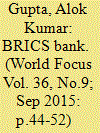

|
|
|
|
|
| Summary/Abstract |
International economic order has always remained biased and discriminatory on account of ‘balance of trade’ being always in favour of developed world. The difference between the developed and the underdeveloped countries grew sharper with the rolling of years in the post-second world war era. While the developed countries made further progress, the condition of under-developed countries did not show any improvement. Consequently, the hiatus between the developed and the under-developed countries went on increasing. The developing countries attributed this to the prevalent international economic order established with the instrumentalities of General Agreement on Tariffs and Trade (GFTT), the International Monetary Fund (IMF), and the International Bank for Reconstruction and Development (World Bank or IBRD).
|
|
|
|
|
|
|
|
|
|
|
|
|
|
|
|
| 2 |
ID:
140626
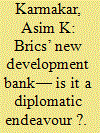

|
|
|
|
|
| Summary/Abstract |
BRICS’ New Development Bank (NDB) comes into prominence as a new international economic order to follow a gradual, but steady process. BRICS summit inFortaleza, Brazil on July 15 is a new signal heralding to open a new chapter that wants to open BRICS' New Development Bank (hereinafter referred to as the NDB ) which has profound implications for global order and development. In fact, the creation of the BRICS bank is significant for future international order for three reasons.
|
|
|
|
|
|
|
|
|
|
|
|
|
|
|
|
| 3 |
ID:
184941
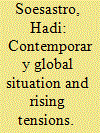

|
|
|
| 4 |
ID:
155241
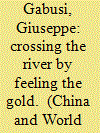

|
|
|
|
|
| Summary/Abstract |
China's Belt and Road Initiative (BRI) is, above all, a connectivity project. As connectivity requires financial support, in the past few years China has undertaken several institution-building activities at the national and international level, mainly in the financial and economic sector, showing a new propensity to influence global economic governance. In particular, the establishment of the Asian Infrastructure Investment Bank (AIIB) has drawn attention worldwide. How does this institution-building process connect with BRI? Are these institutions just a vehicle for exporting China's capital and overcapacity, or do they signal a potential wider challenge to the post-World War II liberal international order? By analyzing the first loans approved by the bank, the present paper argues that far from representing a China-led challenge to the Western-led liberal order, the AIIB, while promoting Chinese commercial and geopolitical interests, shows the resilience of the global financial regime created by the West.
|
|
|
|
|
|
|
|
|
|
|
|
|
|
|
|
| 5 |
ID:
184981
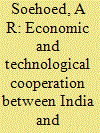

|
|
|
| 6 |
ID:
132152
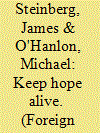

|
|
|
|
|
| Publication |
2014.
|
| Summary/Abstract |
At their summit in California last June, U.S. President Barack Obama and Chinese President Xi Jinping committed themselves to building trust between their countries. Since then, new official forums for communication have been launched (such as the military-to-military dialogues recently announced by the two countries' defense ministers), complementing existing forums such as the Strategic and Economic Dialogue (which features the countries' top diplomats and economic officials). But despite these efforts, trust in both capitals -- and in the countries at large -- remains scarce, and the possibility of an accidental or even intentional conflict between the United States and China seems to be growing. Given the vast potential costs such a conflict would carry for both sides, figuring out how to keep it at bay is among the most important international challenges of the coming years and decades. The factors undermining trust are easy to state. East Asia's security and economic landscape is undergoing massive, tectonic change, driven primarily by China's remarkable economic rise in recent decades. That economic miracle, in turn, has made it possible for China to increase its military capacity and ramp up its political role in the region and beyond. China's leaders and prominent strategists have been at pains to insist that China's rise will be peaceful and poses no threat to its neighbors or the existing international political and economic order. But many members of the world community remain concerned and even skeptical, noting that history and international relations theory are replete with examples of conflict arising from clashes between a dominant and a rising power."
|
|
|
|
|
|
|
|
|
|
|
|
|
|
|
|
| 7 |
ID:
184979
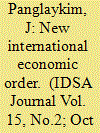

|
|
|
| 8 |
ID:
037709


|
|
|
|
|
| Edition |
Vol 1
|
| Publication |
New Delhi, Deep and Deep Publications, 1985.
|
| Description |
259
|
|
|
|
|
|
|
|
|
|
|
|
Copies: C:1/I:0,R:0,Q:0
Circulation
| Accession# | Call# | Current Location | Status | Policy | Location |
| 025599 | 338.91/SIN 025599 | Main | On Shelf | General | |
|
|
|
|
| 9 |
ID:
184923
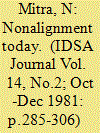

|
|
|
| 10 |
ID:
169953


|
|
|
|
|
| Summary/Abstract |
Summit diplomacy is the initiative to establish contact at the highest level of political leadership to transform the relationship between collectives. The heads of states are key decision makers in the nation. The objective of summit diplomacy is to establish a political dialogue at the highest level. The assumption is that once the understanding is established at the highest level, it can transform a conflicting relationship to friendly one. Rajiv Gandhi’s visit to China in 1988 ended three decades of estrangement between India and China. It is a classic example of the normalisation of relations between two countries. The proposed hypothesis is that the success of Rajiv Gandhi’s summit diplomacy depended on two factors: the leadership personality and the domestic factor. This article primarily deals with the question: How Rajiv Gandhi conducted summit diplomacy with China in 1988? The article traces the process through an analysis of archival work of private papers and diplomatic correspondence, oral history interviews, memoirs, and biographical works.
|
|
|
|
|
|
|
|
|
|
|
|
|
|
|
|
| 11 |
ID:
128257
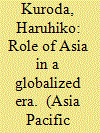

|
|
|
|
|
| Publication |
2013.
|
| Summary/Abstract |
This article first reviews the past 25 years, during which the international political situation as well as international economics and finance underwent major structural changes. It then focuses on Asia, which has recorded remarkable growth and strengthened its financial architecture since the Asian currency crisis. Issues facing Asia are detailed, together with recommendations for Asia's participation in a new international economic order.
|
|
|
|
|
|
|
|
|
|
|
|
|
|
|
|
| 12 |
ID:
148091


|
|
|
|
|
| Summary/Abstract |
As President Tsai Ing-wen assumes power, she faces a citizenry hoping that she can revitalize Taiwan's economy, including: promoting high growth, low unemployment, equitable distribution of income, affordable housing for working people, food safety and quality of life in a democratic country. They also expect that she will not be deterred from engaging in the international arena. However, President Tsai faces several challenges amid slowing growth in much of the world, and Taiwan's partial exclusion from the international economic order will affect prospects for her success in meeting expectations for further economic progress.
|
|
|
|
|
|
|
|
|
|
|
|
|
|
|
|
| 13 |
ID:
116602
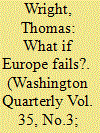

|
|
|
|
|
| Publication |
2012.
|
| Summary/Abstract |
The European Union is engaged in a ferocious political, diplomatic, and economic struggle to preserve the future of the single currency, the Euro, and the viability of what has become known simply as "the project," namely the process of integration that has been the bedrock of Western European politics for over half a century. It is distinctly possible that its members' efforts may fail, either in the short or long term, and give way to an era of disintegration. Some have sounded the alarm: German Chancellor Angela Merkel famously remarked, "If the Euro fails, Europe fails."1 Former president Nicolas Sarkozy of France predicted, "If the euro explodes, Europe would explode. It's the guarantee of peace in a continent where there were terrible wars."2 Polish Foreign Minister Radek Sikorski warned the Euro's collapse could cause an "apocalyptic" crisis.3 Harvard economist Dani Rodrik cautioned "the nightmare scenario would … be a 1930's-style victory for political extremism." After all, "fascism, Nazism, and communism were children of a backlash against globalization."4 The erosion of democracy in Hungary and the rise in support for populist parties in Greece, the Netherlands, Finland, and France appears to some to be the beginning of the end.
|
|
|
|
|
|
|
|
|
|
|
|
|
|
|
|
| 14 |
ID:
051835


|
|
|
|
|
| Publication |
Winter 2003-04.
|
|
|
|
|
|
|
|
|
|
|
|
|
|
|
|
|
|
|
|
|